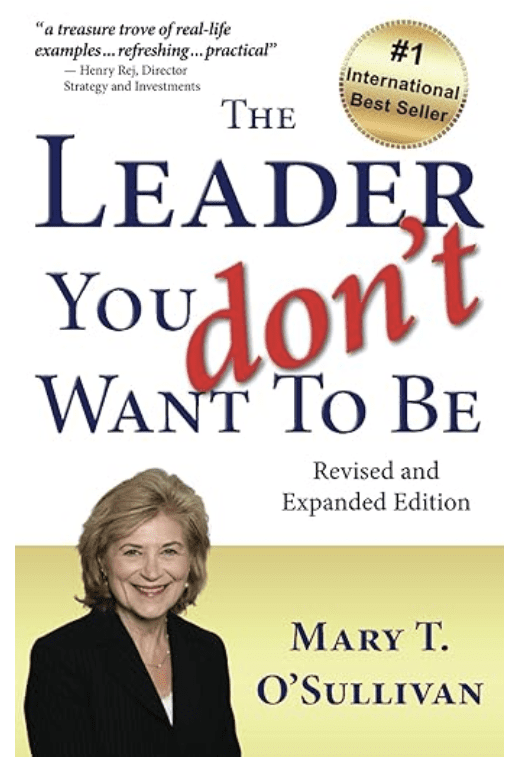Search Posts
Recent Posts
- Vinny Paz to be inducted TODAY into the International Boxing Hall of Fame – CES Boxing June 7, 2025
- In the News… quick recap of the week’s news (6.7.25) June 7, 2025
- Burn with Kearns: Strong without the spend: How scraps became strength tools – Kevin Kearns June 7, 2025
- Rhode Island Weather for June 7, 2025 – Jack Donnelly June 7, 2025
- How to advocate for threatened properties: The Heritage Alliance of Pawtucket June 7, 2025
Categories
Subscribe!
Thanks for subscribing! Please check your email for further instructions.

The ability to make tough calls, regardless of the situation – Mary T. O’Sullivan
By Mary T. O’Sullivan, MSOL, contributing writer on business leadership
“Leaders have edge – the ability to make tough calls, to say yes or no, not maybe.” Jack Welch
Leaders lead with the organization’s mission, vision, values and goals in mind. Every person connected to the organization must be aligned with those standards, or the organization can’t move ahead. So, what happens when a long-time employee can’t behave in a manner that exemplifies what the organization stands for? Often, nothing. Bad behavior is allowed to persist. What happens when a manager has an employee who is untrustworthy, slows down the workflow, or worse, makes the boss look bad? What happens when an entire organization exhibits a colossal failure of leadership? Consider the sex abuse crisis of the Catholic Church. What allowed this predatory behavior to go on for so long?
In each case, the leader could not make a tough call. As Jack Welch has said, “being in a position of power isn’t always fun, and sometimes it means you’ll be put into positions that are very tough to navigate. You’ll need to fire people. Hire people. And make some very tough calls that can make or break an entire organization.”
Yes, with power comes the responsibility of dealing with the ugly parts of the job and having the fortitude to take action, otherwise, the entire organization can suffer. No matter if the person involved is a friend, creates a profitable product, or is the smartest person in the room. Being a leader means having an objective view of the issue at hand and dealing with it. But why is making a tough call so difficult? Recent research has shown three major reasons leaders avoid making tough calls.
- The leader is afraid to estrange those they lead. They have an image to maintain, and they don’t want to disappoint people. In the case of one manager with an obstreperous employee, the manager was afraid of being perceived as a “bad guy”. When asked how long he’d been putting up with the behavior, he said for five years. He then began to slowly realize by tolerating the person for that long, he in fact, made himself appear weak, and as a result wasn’t being promoted.
- The leader over analyzes every aspect of the problem before addressing it. A typical failure of leadership is hiding behind analysis, always needing more data. The long-time employee with behavior issues wasn’t given any notice that his job was on the line. He expected an annual review at a specific time, instead, he was blindsided by a scathing warning from HR, that came months before his annual review. What happened behind the scenes? HR had been collecting data for over six months, without his or his boss’s knowledge. The employee then had to decide whether he was willing to work on his weaknesses or quit. And there is the case of “bring me a rock”. Before making any decision, a leader wants one more piece of data. The “rock” never seems right, another “rock” is always required. A manager is told to create a business plan and assigns the effort to his direct reports. The manager calls a meeting to review the data he requested. When each individual contributor presents his/her findings, the manager rejects each piece of information, whether it be schedule, deliverables: requirements, specs, hiring plans, test plans, etc. The manager may have something in mind or not, in any event, what he’s presented is never exactly what he thinks he wants. He continues to ask for another “rock”, therefore never reaching a decision.
- The leader can’t face the truth and can’t make the right decision. In the case of the abuse scandal in the Catholic Church, leaders for many years hid the horrific behavior of its prelates and other religious. Offenders were simply reassigned or sent to rehabilitation centers. Some of the leaders themselves were ironically, also abusers. The truth was kept quiet and the issue was never dealt with legally. Victims and their families were always too afraid to challenge the Church authorities. In some cases, the truth was swept under the carpet with settlements. Now after many years, these injured families are speaking up, notifying police and legal authorities. Offenders are going to jail. And what has been the impact on the Church? Pope Francis has set up a committee to review all abuse cases, however, it has no provisions to involve any legal system outside the Church. Church attendance has declined. Now, many Catholics are taking matters into their own hands, and directly reporting abuse to the police. The Church has still not fully faced the truth of the matter. It’s a colossal failure of leadership.
With courage, confidence and truth, leaders step up to reality and make the tough calls to guide their organizations into the future. Without these qualities and the ability to make hard decisions, the organization and its people will not thrive.
In the sage words of Jack Welch, “Face reality as it is, not as it was or as you wish it to be.”
“Many people cannot take decisions. Only real leaders face up to realities and take important decisions.” – Dag Heward Mills, from The Art of Leadership
___

Connect with Mary:
www.encoreexecutivecoaching.com
https://www.linkedin.com/in/marytosullivan
Read all Mary’s columns here: https://rinewstoday.com/mary-t-osullivan-msol-pcc-shrm-scp/
–

Mary T. O’Sullivan, Master of Science, Organizational Leadership, International Coaching Federation Professional Certified Coach, Society of Human Resource Management, “Senior Certified Professional. Graduate Certificate in Executive and Professional Career Coaching, University of Texas at Dallas.
Member, Beta Gamma Sigma, the International Honor Society.
Advanced Studies in Education from Montclair University, SUNY Oswego and Syracuse University.
Mary is also a certified Six Sigma Specialist, Contract Specialist, IPT Leader and holds a Certificate in Essentials of Human Resource Management from SHRM.
